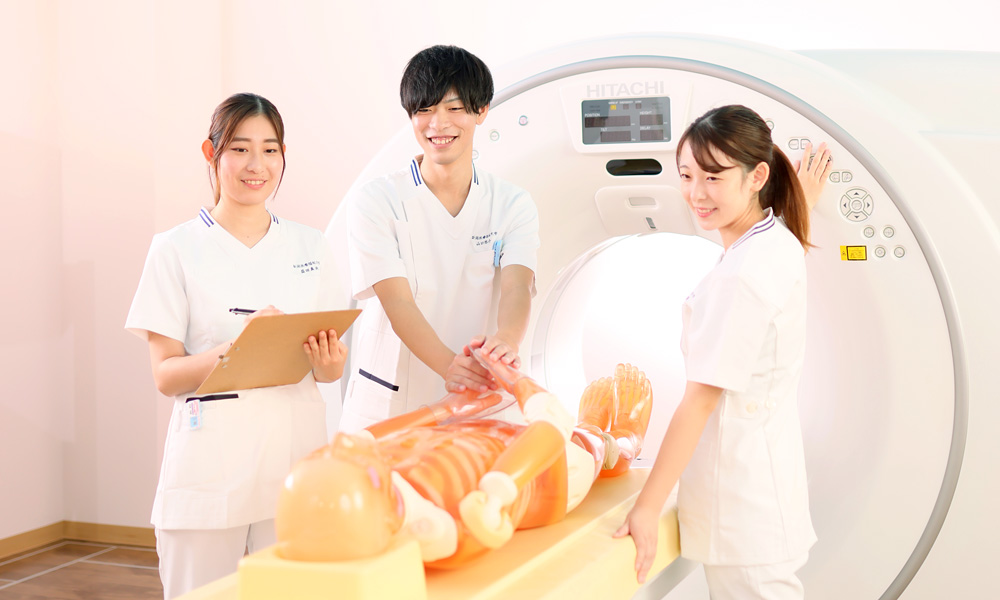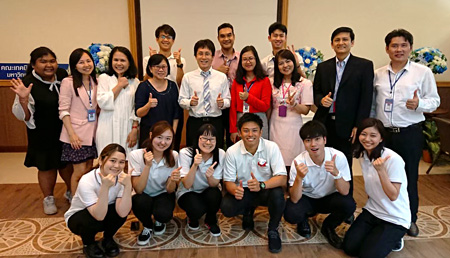
Objectives
Our educational goals are to cultivate professional radiological technologists who have the knowledge of medical radiological technology, nuclear medicine technology, radiation therapeutic technology, radiation protection, radiation safety and medical physics.
Characteristics of the Curriculum
In order to develop the students' knowledge of professional technology, our teaching program is mainly focused on studying radiological technology, image interpretation (detection of abnormal findings etc.) and related theories. There is also some complementary laboratory work focusing on applying knowledge to practice and deepening theoretical understanding. At the end of the program, all the students are expected to have acquired sufficient knowledge to pass the national licensing examinations of radiological technologists.
Qualifications and Careers
Our department prepares students for a number of careers upon graduation. They may practice as radiological technologists in public/private hospitals, clinics, and health care centers or work at private medical equipment companies or biotechnology companies. And most importantly, students will be fully supported by our department to secure an employment of their own choice.
International Activities
 We provide students with opportunities to meet radiological technologists or radiographers in other countries. In 2018, our department entered into an exchange agreement with Mahidol University in Bangkok, Thailand. Students have been there to study cross-cultural communication.
We provide students with opportunities to meet radiological technologists or radiographers in other countries. In 2018, our department entered into an exchange agreement with Mahidol University in Bangkok, Thailand. Students have been there to study cross-cultural communication.
Diploma, Curriculum and Admission Policies (Department of Radiological Technology)
| STEPS Abilities and attitudes of qualified QOL supporters |
Diploma Policy NUHW grants a bachelor's degree to the students who have acquired the following abilities and attributes. |
Curriculum Policy NUHW implements the curriculum as follows in order to help students develop into competent QOL supporters. |
Admission Policy NUHW seeks students who have the following abilities and attributes. |
|
|---|---|---|---|---|
| S | Science & Art Ability to utilize scientific knowledge and skills in academic discipline |
Abilities to utilize their advanced scientific knowledge and skills in radiologocal technology | We provide the following subjects; fundamental subjects such as Clinical Medicine and Radiology, and specialized subjects such as Imaging Anatomy, Diagnostic Imaging, and Diagnostic Imaging Technology. Students learn about suitable image reconstruction from each case imaging. The learning outcomes will be evaluated by the national examination results. | Basic academic skills and learning abilities of subjects, such as English, Japanese, Mathematics, and Physics, at the high school graduation level |
| T | Teamwork & Leadership Ability to work together as a team and to show leadership qualities |
Abilities to demonstrate leadership as radiological technologists for solving clients' problems in interprofessional collaborative practices | We provide Medical Radiology Theory, and Diagnostic Radiology Theory which basic knowledge and skill. And further, the curriculum provides Emergency Medical Theory and Interprofessional Seminar. The learning outcomes will be evaluated by the achievements in Clinical Practices. | Abilities to listen carefully to others and communicate ideas in an easily understandable fashion, and to communicate and cooperate with others |
| E | Empowerment Ability to support clients by giving them powers to promote QOL |
Attitude to be responsible for performing professional duties as radiological technologists to promote clients' QOL with respect and support for their diverse backgrounds | Our curriculum provides advanced basic courses such as Emergency Medical Science, Public Health Science and, professional courses such as Medical Examination Technology, Nuclear Medicine Technology, Radiation Therapy Technology, Medical Image Information, and Clinical Practice. The learning outcomes will be evaluated by the achievements in Clinical Practices. | Abilities to grasp others' opinions and feelings through dialogs and interactions and attitudes to understand them empathetically |
| P | Problem-solving Ability to find ways of solving problems and propose better solutions |
Abilities to identify problems and provide better solutions in clinical practices as radiological technologists based on scientific assessment | Students learn the following subjects and graduate research; specialized major courses such as Radiation Safety Management, Medical Safety Management, and adopted lectures as Problem Based Learning (PBL). And the Research Practicum provides the capability for logically finding the problem and their solution. The learning outcomes will be evaluated by the achievements in Clinical Practices and in the Research Practicum. | Abilities to incorporate others' opinions and consider multilaterally in order to make a valid judgment on various issues |
| S | Self-actualization Attitude towards the fulfillment of his/her potential |
Attitude to maintain interests in advances in modern medicine to participate and contribute as part of their lifelong learning in radiological technology | Our curriculum provides the specialized subjects such as Diagnostic Imaging, Emergency Examination Technology, Radiopharmaceuticals, Radiation Oncology, and Medical Information System Science. The learning outcomes will be evaluated by the achievements in Clinical Practices and in the Research Practicum. | Abilities to maintain wide-ranging interests in issues of health, medicine, welfare, and sports, and high motivation to contribute to the local community as radiological technologists |
| Remarks | Refer to University Regulations, Article 1 | Refer to School Manual(Gakusei Binran) | Refer to Guidelines for Applicants(GakuseiBoshu Yohko) | |
| Degree to be awarded | Bachelor of Radiological Technology | |||
Notes: "STEPS" is a acronym formed from the words, which represent "the five requirements" for qualified QOL supporters.
NUHW stands for Niigata University of Health and Welfare.

